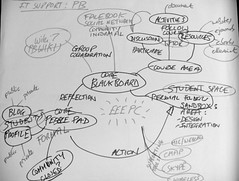There is a popular business book from 2000 by Jeffrey Pfeffer and Robert Sutton entitled “The Knowing-Doing Gap.” The premise is that there is a gap between what businesses know they should do and what they actually do.
Why this happens should not be a surprise to anyone who has tried to make a change or improvement in their personal life. Getting in shape and losing weight are two obvious goals that come to mind that are extremely difficult to achieve.
A more recent book by Charles Duhigg, “The Power of Habit: Why We Do What We Do in Life and Business,” also sheds some light on this phenomenon. The way we act is determined by a series of cues that tend to propel us down a familiar road. As individuals or business organizations, we tend to go through the day like a train on a track – on a pre-determined course – without thinking about other possible paths or different ways to do things.
Unless we make a conscious effort to act differently, usually motivated by some crisis or sudden change in conditions, we tend to behave as usual. While, in one sense, change is constant, human also tend to keep things the same. Why is that? Here are a few factors that contribute to this phenomenon and make it remarkable that anything new ever gets utilized.
Competition for Limited Attention
One of our most precious resources is our attention. By doing things in a routine and pre-determined way, we are able to conserve our attention, presumably for more important things. We don’t usually pay close attention to a routine activity unless it becomes an existential threat. In terms of opportunity cost, if we’re paying close attention to “activity A,” what are we ignoring that could hurt us?
Fear of Risk
In trying to make things better, we could make them worse… sometimes much worse. Most people have heard stories of new technology disasters. “What if we put in a new system that fails and we aren’t able to produce documents for discovery? We could be ruined, like Acme and Talbot.”
Lack of Technology Product Understanding
Trying to understand and evaluate technology products as a non-technologist can be extremely confusing. Marketers know that consumers need to have a limited array of choices or they will not be able to make an informed buying decision. However, most sellers of technology are used to selling to large companies, where the “buyer” is a technologist just like them and can speak the same technical language. Small-firm attorneys or business owners have a more pragmatic, bottom-line perspective, making real communication difficult.
Lack of Technology Process Understanding / Lack of Available Resources
Even with all the decisions made and the contracts signed, many smaller organizations don’t have anybody with the available time and skills to manage the details of a new system implementation or in-house process change. There is a pre-defined process for executing this and while some office managers or paralegals are very effective at coordinating these activities, it can easily become chaotic and overwhelming.
Please watch for the Part 2, “Overcoming the obstacles to technology adoption,” in an upcoming edition.
Mark Lenetsky is an experienced technology consultant and organizational developer, with certifications in eDiscovery, project management and knowledge management. He provides eDiscovery and technology services to boutique law practices and other small organizations. He welcomes questions and comments at This email address is being protected from spambots. You need JavaScript enabled to view it. or through his web site, www.adaptable-tech.com.







